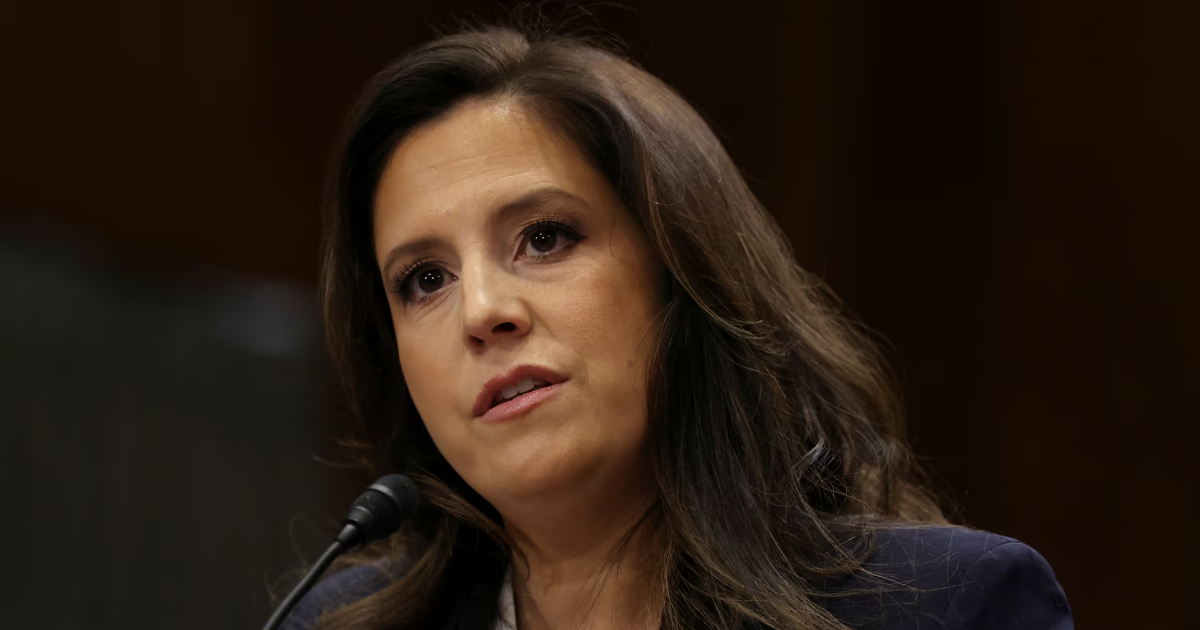WASHINGTON, March 27 (Reuters) – U.S. President Donald Trump said on Thursday he had withdrawn his pick to be ambassador to the United Nations because the Republicans need to maintain their slim majority in the House of Representatives to advance his “America First” agenda.
Republican Representative Elise Stefanik is a close Trump ally and was chosen by the president for the U.N. role less than a week after he was elected in November. CBS News first reported that Stefanik’s nomination could be withdrawn.
Sign up here.
“It is essential that we maintain EVERY Republican Seat in Congress,” Trump said in a social media post. “With a very tight Majority, I don’t want to take a chance on anyone else running for Elise’s seat.”
Republicans hold a narrow 218-213 majority in the U.S. House of Representatives, where there are four vacancies, as they prepare to try to extend Trump’s 2017 tax cuts and address a national debt that tops $36.6 trillion.
A spokesperson for Stefanik did not immediately respond to a request for comment.
Stefanik was the last cabinet-level Trump nominee who had not been confirmed. She was approved by the Senate Foreign Relations Committee, with some Democratic votes, on Jan. 30 and had been expected to be easily approved by the full Senate.
U.S. House Speaker Mike Johnson praised Stefanik.
“It is well known Republicans have a razor-thin House majority, and Elise’s agreement to withdraw her nomination will allow us to keep one of the toughest, most resolute members of our Conference in place to help drive forward President Trump’s America First policies,” he said in a social media post.
‘GREAT POTENTIAL’
Veteran U.S. diplomat Dorothy Shea has been the acting U.S. ambassador to the U.N. since the Biden administration’s envoy Linda Thomas-Greenfield stepped down in January. It was not immediately clear who Trump might choose to replace Stefanik.
“There are others that can do a good job at the United Nations,” Trump wrote.
The United States is the largest contributor to the U.N. budget. It was also one of the world’s largest humanitarian aid donors, but the Trump administration has slashed billions of dollars in foreign assistance, including to U.N. agencies.
Trump said in February that the United Nations has “great potential and … we’ll continue to go along with it, but they got to get their act together.”
The U.N. pushed back at the time, saying Secretary-General Antonio Guterres had worked tirelessly to implement reforms. Earlier this month Guterres announced a new initiative to improve efficiency and cut costs as the world body turns 80 this year amid a cash crisis.
Guterres has not yet spoken with Trump or Secretary of State Marco Rubio.
Since returning to office on January 20, Trump has stopped U.S. engagement with the U.N. Human Rights Council, extended a halt to funding for the Palestinian relief agency UNRWA and ordered a review of the U.N. cultural agency UNESCO.
He has also announced U.S. plans to quit the Paris climate deal and the World Health Organization.
Reporting by Jeff Mason and David Morgan; Additional reporting by Patricia Zengerle and Michelle Nichols; Writing by Michelle Ncihols; Editing by Daniel Wallis and Nick Zieminski
Our Standards: The Thomson Reuters Trust Principles.
Jeff Mason is a White House Correspondent for Reuters. He has covered the presidencies of Barack Obama, Donald Trump and Joe Biden and the presidential campaigns of Biden, Trump, Obama, Hillary Clinton and John McCain. He served as president of the White House Correspondents’ Association in 2016-2017, leading the press corps in advocating for press freedom in the early days of the Trump administration. His and the WHCA’s work was recognized with Deutsche Welle’s “Freedom of Speech Award.” Jeff has asked pointed questions of domestic and foreign leaders, including Russian President Vladimir Putin and North Korea’s Kim Jong Un. He is a winner of the WHCA’s “Excellence in Presidential News Coverage Under Deadline Pressure” award and co-winner of the Association for Business Journalists’ “Breaking News” award. Jeff began his career in Frankfurt, Germany as a business reporter before being posted to Brussels, Belgium, where he covered the European Union. Jeff appears regularly on television and radio and teaches political journalism at Georgetown University. He is a graduate of Northwestern University’s Medill School of Journalism and a former Fulbright scholar.
